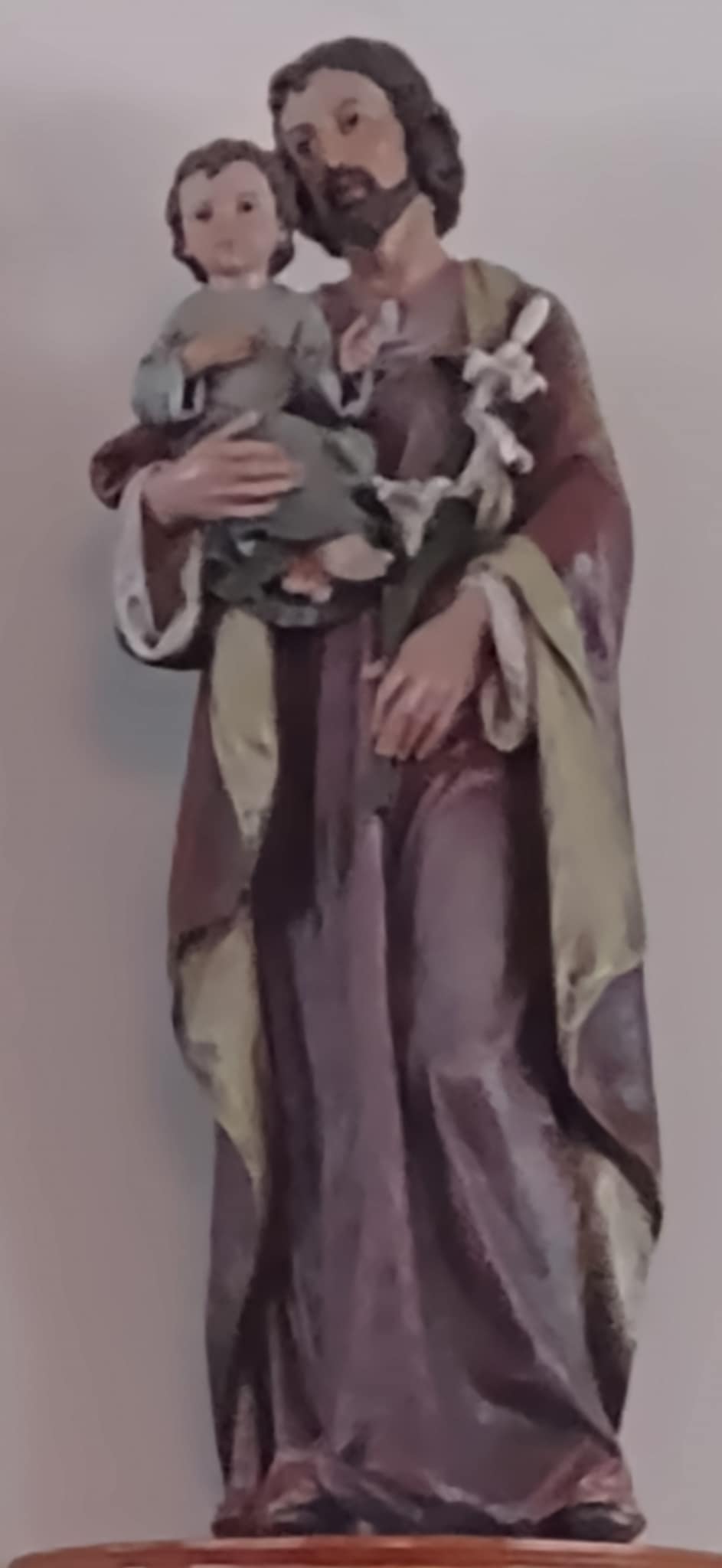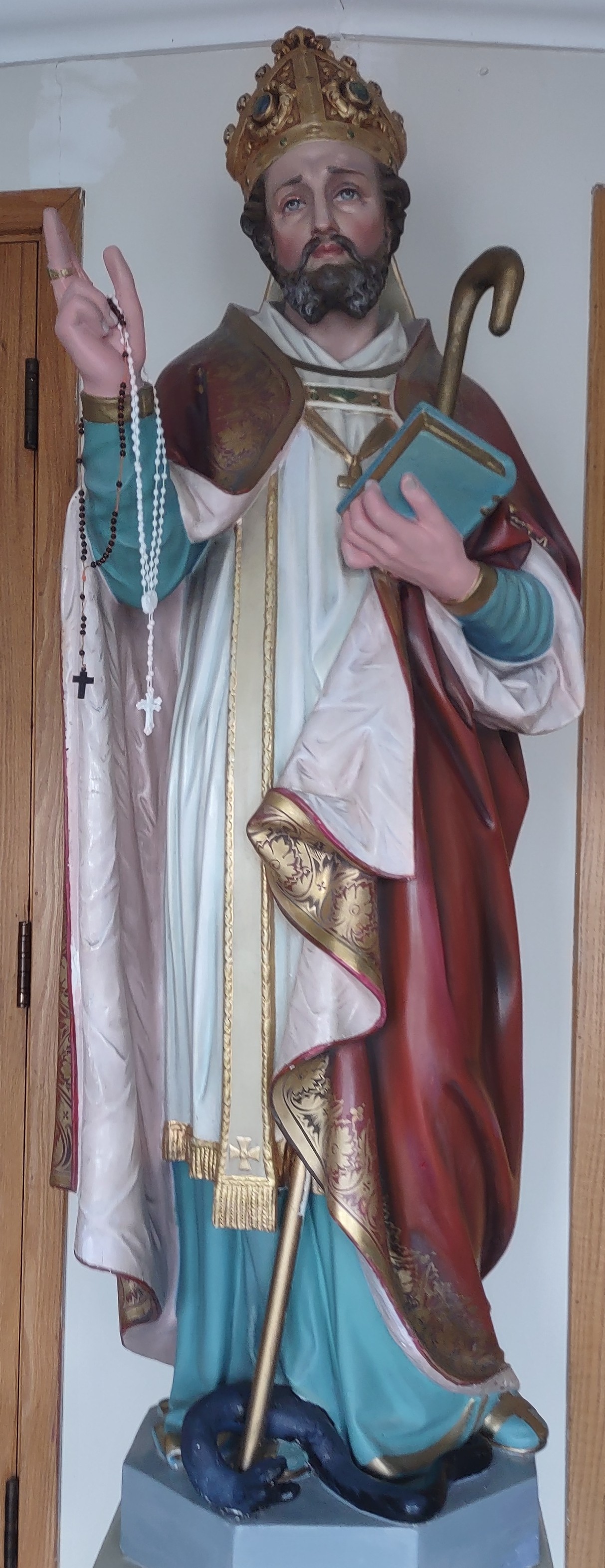- Home
- Other Catholics
- Roman Catholic Or Celtic Catholic
Simply Catholic and Welcoming You
Roman Catholic or Celtic Catholic
Hierarchical Versus Locally Based Catholicism

St. Joseph and the Christ Child
Roman Catholic or Celtic Catholic, what is the difference between them?
Unlike the Roman Catholic Church, which was strictly hierarchical, legalistic, and elitist, the Celtic Church was provincial and local based, monastic, mystical, and celebrated the sacredness of nature, thus reflecting the patterns of life in the communities in which the church flourished. These were, in fact, cultural hallmarks of the Romans and Celts which were then, perhaps predictably, reflected in their expressions of the same faith.
There were certain traditions and practices present in both the Irish and British churches that were not seen in the wider Christian/Roman Catholic world.The term Celtic Catholic typically denotes the regional practices among the insular churches and their associates rather than actual theological differences.
As a whole, Celtic-speaking areas were part of Latin Christendom at a time when there was significant regional variation of liturgy and structure. There was much more local autonomy. But a general collective veneration of the Papacy and the concept of the church being “One, Holy, Catholic and Apostolic” was no less intense in Celtic-speaking areas.
Celtic Christianity is seen as less authoritarian than the Roman Catholic Church, more spiritual, friendlier to women, more concerned with nature and more comfortable with Celtic polytheism.
Today's historians and religious scholars are more than ever in agreement that the differences and distinctions between Roman Catholic or Celtic Catholic, too often exaggerated by today' s Neo Celtic groups, had much less to do with any distinct or separate Celtic church compared to the established Roman Catholic church and more to do with the regional and insular nature of the Celtic churches, convents and monasteries which were, geopolitically, more influenced by their own languages and cultures than by the cultures of the ever changing representatives of the church sent to teach them.
For information on the Neo-Celtic Catholic movement please click here.
I am Irish born myself. As such I have enjoyed lived experiences of both the authoritative church and the more locally authentic church. I mean authentic in the context of truly joining the Catholic faith with the local cultures and regional inclusivity.
I hold the personal belief that the church, in the greater expression, moved too much to embrace the Roman Empirical dynamic. Making the Pope their Emperor, Cardinals their Kings, Bishops their Princes and the masses their ‘serfs’/servants. In time this became the tradition, expectation and experience of the church. Christ stated clearly that the leaders must be the servants of all. How has the church maintained and justified this structure?
Likewise, where local bishops are granted too much autonomy, it is possible for them to create their very own, private little fiefdoms. Neither extreme honors or follows the example and direction of Christ!
Roman Catholic or Celtic Catholic
Accountability to the Institution or to the People?

St. Patrick of Ireland
Whether Roman Catholic or Celtic Catholic, in all things there must be balance. In day to day operations for any church, local leaders must be given a certain autonomy to lead and direct. To effectively shepherd the flock they are at once called to provide spiritual leadership of, while still deliberately and actively serving their clergy and congregation as Christ has called them to do. Not as man, including their own personal natures would have them lead by ruling, but by serving as Christ has taught us to do, relying on the dictates of the Holy Spirit for direction in all things.
Simultaneously, bishops and other church leaders must have local, regional and global accords. This is where the concept of a council of bishops originally came into play. Leaders were called to meet together in various conferences to ensure global unity, while each was also there to advocate for their regional and local needs, including such things as local liturgies, feast days that celebrate local events and local Saints.
Roman Catholic or Celtic Catholic leadership should be upholding the “Church” as the people, the body of Christ. Church leaders should absolutely not be seeking to develop the church as the absolute power, the institution of the church. A corporate collective of global CEO’s, shell companies, bricks and mortar institutions becoming a self-serving entity that continually amasses wealth, influence and power that they then deny the common people to even dare question.
Leadership must always remain accountable to those they claim to serve. Why does the leadership of the mainstream Catholic churches believe the people are accountable to them yet they are not accountable to the people?
What is the purpose of these churches being such wealthy and powerful entities if they do not then use that influence, power and wealth to serve the vulnerable, the poor, the outcast in our global and local societies? What happened to give your wealth to the poor and come follow me?
In Matthew 19-21 Jesus tells the rich man to give up all of his wealth and sell everything he owns and give the money to the poor and come and follow Him. In this way, Jesus says, you will have treasure in heaven. The purpose of this comment is to expose the blindness of this wealthy young man, and his ultimate lack of sincerity. Surely this same admonition is true of our churches?
When did the mainstream Catholic churches become such absolute powers that they clearly believed they are a law unto themselves and focused on self protectionism while not only tolerating clergy abuse of the people they were called to serve but actually, systemically protecting those very same abusers?
Why do the leaders of today's largest Catholic Churches focus on appearances rather than service, accountability or love?
Why do they insist on the need for the ‘Majesty of the church’, it's wealth, power, outright opulence, to attract people when Christ surely proved the opposite to be the truth?
How can they insist that the tradition of the church/man has more weight than the very Word of Christ?
Whilst I believe that the core of our faith has persevered, despite the church as much as because of the church, we have too long been ruled by foolish and ambitious men masquerading as emissaries of Christ. The claims to be holy men while permitting or actually perpetrating unholy acts have fooled too many for too long!
People can only be led by traditionally entrenched, unrighteous leadership until the people are educated. Then comes first outrage, then accountability and then change. In many places the faithful have already lived through the outrage. Today we demand accountability and pray that true and meaningful change will follow soon.
Why am I asking so many questions and then leaving them unanswered? It is because the answers go back to the very heading of this article. Churches that structure themselves as empires or monarchies and function as strictly hierarchical, legalistic, and elitist ultimately become guilty of the very abuses and other issues questioned above. These outcomes were always predictable.
That this particular Empire/Monarchy has not fallen is only by the grace of God and the efforts of truly Holy people who have fought from within for true Christian values and outcomes. God Bless them all!
Meanwhile more and more offshoot branches of Catholicism have been springing up since the declaration of Papal Supremacy and Infallibility. Old Catholics, Liberal Catholics, Independent Catholics and yes, Celtic Catholics and more. Each has attempted to distance themselves from some failing, overreach or abuse from our common parent church. While some have fought for the truth within the Latin/Roman Catholic Church others have come to understand that the needed changes would not occur in their lifetimes or they could no longer be in good conscience and remain involved in the parent church.
Their choices of names and structure often reflect what perceived fault caused their specific schism from Rome or the papacy. Those with personal Celtic roots and the new/Neo Celtics choose to embrace a structure and way of the faith that is perceived as seeking to restore or re-assert beliefs and practices associated with early Celtic Christianity, often characterized as gentle, tolerant, inclusive and clearly more friendly towards women, holistic, mystical, and celebrating the sacredness of nature, thus reflecting the patterns of life in the communities in which the church flourished.
At St. Brigit’s Community Catholic Church we very much embrace those same concepts and structures. We have acknowledged my Irish/Celtic roots by including St. Brigit in our choice of church name and, by doing so, still pointed to our choice of structure and practice or way of practicing our faith.
We choose to be called Community Catholic over Celtic Catholic because the word catholic already, literally, means universal and we wanted to acknowledge the importance of local community autonomy and global scope.
Recent Articles
-
The Basic Catechism of the Catholic Church
Feb 12, 26 11:03 AM
A basic catechism of any rite or branch of the catholic church acts as a primary reference for teaching the faith -
The Divine Office
Feb 07, 26 11:07 AM
The Divine Office The Divine Office, also known as the Liturgy of the Hours or Opus Dei ("Work of God"), is the official, daily set of prayers of the Catholic Church -
Women Being Removed or Voided from Scriptures
Jan 17, 26 05:06 PM
The concept of women being "removed" or "voided" from scriptures refers to both the physical exclusion of female narratives in historical texts...
Boat Harbour West, Newfoundland, Canada. Cell Number 709-276-0626
Join Us Also on Our St. Brigit's Community Catholic Church Prayer group on Facebook: https://www.facebook.com/groups/324523956473448


